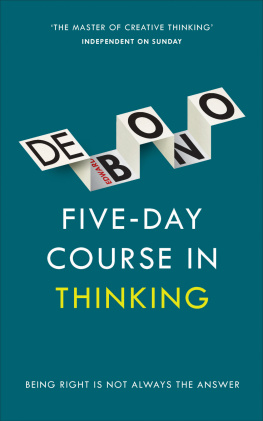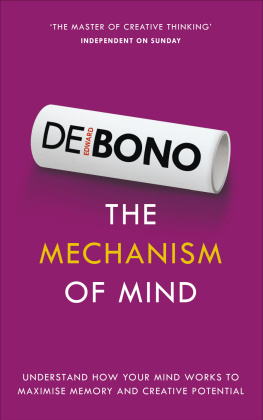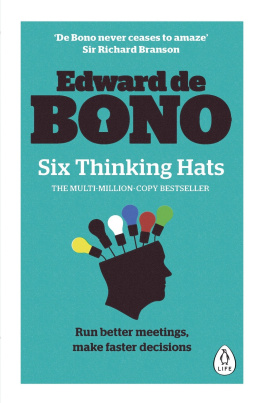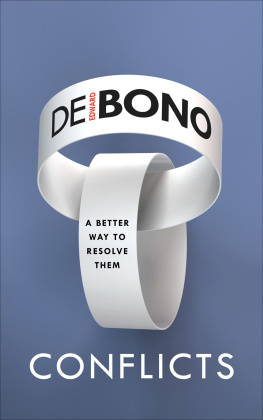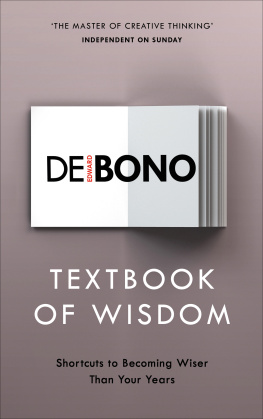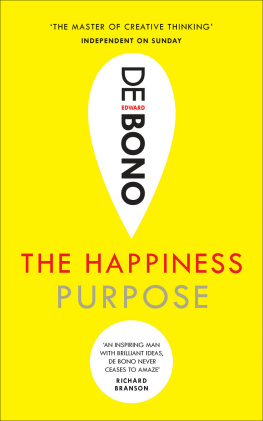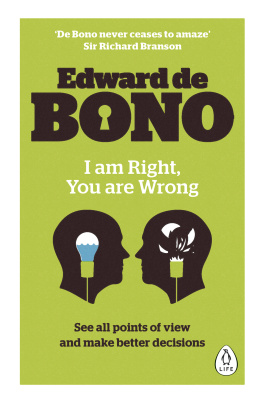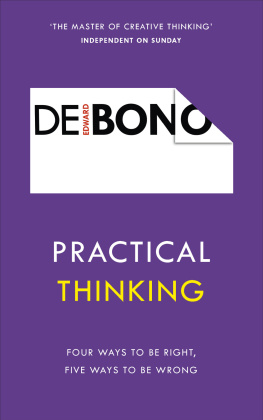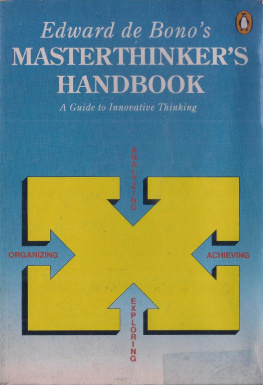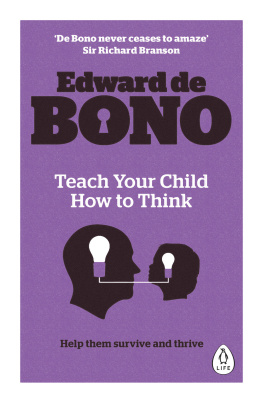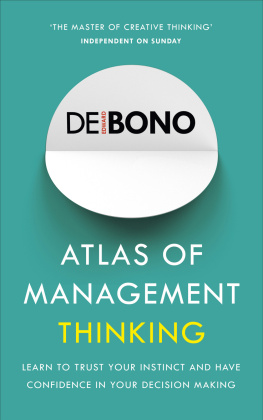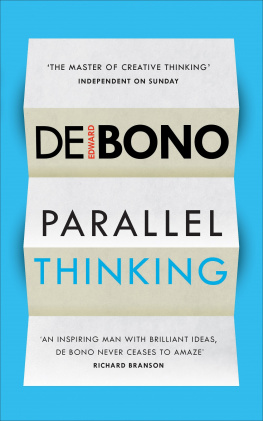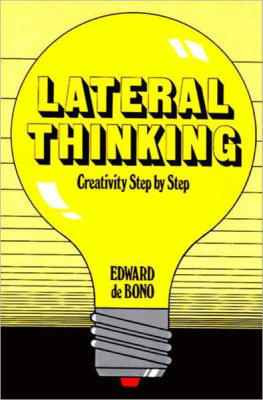Based on the belief that an error can lead to the right decision, de Bono guides the reader through a series of problems and puzzles, all designed to help us analyse our personal style of thinking and to consider the potential methods that we never use.
There are three courses, each five days long and each created to focus on a different style of thinking. A true life-changer, this book will have you thinking in ways that you never thought were possible.
Edward de Bono studied at Christ Church, Oxford (as a Rhodes Scholar). He also holds a PhD from Cambridge and an MD from the University of Malta. He has held appointments at the universities of Oxford, London, Cambridge and Harvard.
In 1967 de Bono invented the now commonly used term lateral thinking and, for many thousands, indeed millions, of people worldwide, his name has since become a symbol of creativity and new thinking. He has written numerous books, which have been translated into 34 languages, and his advice is sought by Nobel laureates and world leaders alike.
ALSO IN THE SERIES
The Six Value Medals
How to have a Beautiful Mind
How to have Creative Ideas
Think!
Six Frames
Serious Creativity
Lateral Thinking
The Mechanism of Mind
H + (Plus) A New Religion?
Parallel Thinking
THE FIVE-DAY COURSE IN THINKING
Edward de Bono
AUTHORS NOTE
The division into three different sorts of thinking (Insight Thinking, Sequential Thinking, Strategic Thinking) is by no means a rigid one. The sections overlap to some extent and particular processes may be found under different headings. The basic processes of thinking are common to all sections but certain aspects of thinking are brought out in one section more than in another. The headings are only descriptive of this different emphasis and are not instructions on how to tackle the sections.
INSIGHT THINKING: The steps leading up to the solution are not all apparent. The solution seems to come about by virtue of a sudden jump in thinking. It is more a matter of finding the right approach than of care in pursuing an approach.
SEQUENTIAL THINKING: The solution follows a progressive sequence of steps (modification, improvement, mistakes, new ideas, etc.). The sequence need not be a logical sequence; nevertheless, the steps occur one after another.
STRATEGIC THINKING: This is concerned with the choice of the most appropriate steps out of a multitude of possible steps. The search is not for a definite solution but for a policy of behaviour that is more effective than others.
Insight problems may, of course, be solved by sequential processes just as sequential problems may be solved in an insight fashion. Both processes may be used in strategic thinking.
PREFACE
Most people do not bother any more about their thinking than they do about their walking or breathing. Thinking seems a natural enough process and one is happy with ones competence. There is, however, much more individuality in thinking styles and sufficient difference between individuals to suggest that thinking may be a skill about which something can be done.
The long years of education are mostly concerned with knowledge. Fact is piled upon fact and little if any time is spent with the basic techniques of thinking. Skill in thinking is treated as a by-product that ought to follow detailed attention to specific subjects. But does it? And if it does, is not this a very roundabout and wasteful process like burning down the pagoda to produce roast pork? On the whole, it must be more important to be skilful in thinking than to be stuffed with facts.
This book has to do with thinking. The situations are chosen to bring out points about thinking techniques just as lighting is chosen to show up the features of a subject being photographed.
It is rather boring just to read about thinking but there can be a lot of fun in playing around with ones own thinking processes. This book is not a do-this and do-that book. Based on the three points of simplicity, involvement and achievement, the book is intended to amuse the reader into developing an awareness of his own style of thinking, its strong points and its weaknesses. One reader may always get blocked at a certain point. Another reader may never make use of certain strategies. Awareness is the first step to correction and improvement in any skill.
The only effort required from the reader is that he should ask himself the question: Why am I having difficulty over this?
In this book nothing is taught except what is learned and that depends on the reader. The suggestions in the text are only intended to stimulate the readers own ideas on thinking. An awake reader will get far more from the book than a dull reader and probably more than the author has put in.
Having bought this book, you are entitled to use it as you please. There is no hurry. Like the empty space in a Chinese painting, the time in which nothing happens has its purpose.
The courses are designed in leisurely, consecutive steps, and the order of each course should be maintained.
EDWARD DE BONO
July 1967
CONTENTS
The First 5-Day Course in Thinking
The Bottles: Insight Thinking
The Second 5-Day Course in Thinking
The Blocks: Sequential Thinking
The Third 5-Day Course in Thinking
The L Game: Strategic Thinking
THE FIRST 5-DAY COURSE IN THINKING
The Bottles: Insight Thinking
INTRODUCTION
Start the course tomorrow. Until then do nothing other than consider whether your thinking is as fluent and effective as it might be. Consider its present excellence, but consider more whether such excellence precludes any further development. Expect with this course either to demonstrate such excellence or to doubt it.
The opportunities to exercise your thinking are to be real rather than imaginary. This is a practical course, and some equipment must be assembled:
- Four empty beer or soft drink bottles
- Four table knives (preferably with flat-sided handles, and with rounded tips for the sake of safety)
- A drinking glass filled with water
Thinking about something is the only way to think about thinking, and having something to show for the thinking is the only way to judge its worth.
The first five-day course uses the sort of problem which is usually solved quite suddenly by a flash of inspiration what might be called insight thinking.
THE FIRST DAY
PROBLEM 1
Place three bottles upright on a table or on the floor. Position them so that each bottle forms the corner point of a triangle of equal sides. The distance between the bases of any two bottles should be slightly more than the length of a knife.
Using only the four knives, construct a platform on top of the bottles. No part of any knife may touch the ground. The platform must be strong enough to support a full glass of water.
That is the problem. You may approach it as you wish. You may attack it with logic, or you may play around with the knives until something turns up. You may wait for the solution to occur to you, or you may deliberately search for it. You may even decide that the problem has no solution.

